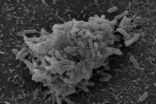(Press-News.org) PHILADELPHIA – Groundwater and air quality testing before, during, and after natural gas drilling – which includes hydraulic fracturing -- should be key components of efforts to ensure the safety of communities near these sites, according to an expert panel convened to weigh in on public health research needs associated with unconventional natural gas drilling operations (UNGDO). The panel also urges that any research conducted should use "community-based participatory research principles" so that the concerns of the many stakeholders involved in these activities can be addressed.
A group of environmental health researchers, led by Trevor Penning, PhD, director of the Center of Excellence in Environmental Toxicology (CEET) at the Perelman School of Medicine, University of Pennsylvania, published their findings this month in Environmental Health Perspectives.
UNGDO, which includes hydraulic fracturing and horizontal drilling, supplies an energy source which is potentially cleaner than liquid or solid fossil fuels and may provide a route to energy independence for the U.S, say proponents. However, significant concerns have arisen due to the lack of research on the public health impact of this type of energy extraction.
"The working group was convened following presentations on the potential of natural gas drilling to adversely affect public health at the 2012 Annual Environmental Health Sciences Core Centers [EHSCC] meeting at Harvard School of Public Health," states Penning.
Sixteen of the twenty EHSCCs funded by the National Institute of Environmental Health Sciences (NIEHS) joined the working group to review the literature on the potential public health impact of UNGDO and to make recommendations for research.
The Inter-EHSCC Working Group concluded that a potential for water and air pollution exists that might endanger public health and that the social fabric of communities could be affected by the rapid emergence of drilling operations. The working group recommends research to inform how potential risks could be mitigated.
Some of the key suggestions are:
Baseline ground water quality data should be taken before drilling begins and be monitored over the lifetime and abandonment of the gas-producing well.
Ambient and occupational air quality should be measured at active drilling sites and be compared with baseline measurements in adjacent areas without drilling operations.
An environmental epidemiological study should be performed to determine whether an association exists between health outcomes data and water quality in private drinking wells in communities with and without hydraulic fracturing.
An environmental epidemiological study should be performed to determine whether air pollution associated with UNGDO increases the incidence of respiratory illness and cardiovascular disease.
Community-based participatory research principles should be embraced in designing and conducting studies on environmental and health impacts of UNGDO so that a range of community perspectives are addressed. All stakeholders (individual/community/industry/advocacy groups/decision makers) should be engaged early to foster multi-directional communication and accountability.
INFORMATION:
Coauthors are Marilyn Howarth, Penn CEET; Patrick N. Breysee, Johns Hopkins University Bloomberg School of Public Health, Baltimore, MD; Kathleen Gray, University of North Carolina at Chapel Hill, NC; and Beizhan Ya, Lamont Doherty, Earth Observatory of Columbia University, NY.
The working group is supported by grants from the NIEHS: P30¬ES013508 (Penn); P30-ES010126 (UNC); P30-ES003819 (Johns Hopkins); P30-ES009089 (Columbia University); P30-ES000002 (Harvard); P30-ES000210 (Oregon State); P30-ES000260 (NYU); P30-ES005022 (Rutgers); P30-ES006096 (University of Cincinnati); P30-ES005605 (University of Iowa); P30-ES001247 (University of Rochester), P30-ES007048 (USC); P30-ES006676 (UT-Medical Branch); P30-ES007033 (University of Washington) and P30 ES004184 (University of Wisconsin -Milwaukee).
Editor's Note: Penning has given expert testimony in methyl¬tert-butyl-ether products liability litigation. The other authors declare they have no actual or potential competing financial interests.
Penn Medicine is one of the world's leading academic medical centers, dedicated to the related missions of medical education, biomedical research, and excellence in patient care. Penn Medicine consists of the Raymond and Ruth Perelman School of Medicine at the University of Pennsylvania (founded in 1765 as the nation's first medical school) and the University of Pennsylvania Health System, which together form a $4.3 billion enterprise.
The Perelman School of Medicine has been ranked among the top five medical schools in the United States for the past 17 years, according to U.S. News & World Report's survey of research-oriented medical schools. The School is consistently among the nation's top recipients of funding from the National Institutes of Health, with $392 million awarded in the 2013 fiscal year.
The University of Pennsylvania Health System's patient care facilities include: The Hospital of the University of Pennsylvania -- recognized as one of the nation's top "Honor Roll" hospitals by U.S. News & World Report; Penn Presbyterian Medical Center; Chester County Hospital; Penn Wissahickon Hospice; and Pennsylvania Hospital -- the nation's first hospital, founded in 1751. Additional affiliated inpatient care facilities and services throughout the Philadelphia region include Chestnut Hill Hospital and Good Shepherd Penn Partners, a partnership between Good Shepherd Rehabilitation Network and Penn Medicine.
Penn Medicine is committed to improving lives and health through a variety of community-based programs and activities. In fiscal year 2013, Penn Medicine provided $814 million to benefit our community.
Penn-led expert panel calls for public health research on natural gas drilling
2014-08-11
ELSE PRESS RELEASES FROM THIS DATE:
Rutgers researchers show that how fast you drive might reveal exactly where you are going
2014-08-11
In our constantly connected, information-rich society, some drivers are jumping at the chance to let auto insurance companies monitor their driving habits in return for a handsome discount on their premiums.
What these drivers may not know is that they could be revealing where they are driving, a privacy boundary that many would not consent to cross.
A team of Rutgers University computer engineers has shown that even without a GPS device or other location-sensing technology, a driver could reveal where he or she traveled with no more information than a starting location ...
School violence, gun-related injury among top 10 child health concerns nationally
2014-08-11
ANN ARBOR, Mich. – Childhood obesity remains the top health concern for children in 2014, but when asked about national concerns, adults put school violence and gun-related injuries in the top 10, according to a new University of Michigan C.S. Mott Children's Hospital National Poll on Children's Health.
In the poll's annual top 10 list, a nationwide sample of adults were asked to identify the biggest health concerns for kids in their communities, as well as kids nationwide. Overall, childhood obesity is rated at the top of both lists: 29 percent of adults said obesity ...
Inequality -- a key issue of economic research
2014-08-11
In the aftermath of the global financial crisis and the ensuing economic and political disruptions, inequality has re-emerged as a central focus of public debate. The drivers of rising inequality of income and wealth and the various scientific models for counteractive measures will be among the central topics debated among 17 Nobel Laureates in Economic Sciences and approximately 450 aspiring young economists from more than 80 countries in Lindau, Germany, next week. The 5th Lindau Meeting on Economic Sciences will bring them together for a unique dialogue across generations, ...
Clues emerge to genetic architecture of cognitive abilities in children
2014-08-11
How genes affect intelligence is complicated. Multiple genes, many yet unknown, are thought to interact among themselves and with environmental factors to influence the diverse abilities involved in intelligence.
A large new genetic study in thousands of children and adolescents offers early glimpses of the overall patterns and connections among cognitive abilities such as language reasoning, reading skill and types of memory. The findings may lead to new tools in understanding human cognitive development and neuropsychiatric disorders.
"This research is one of the ...
More intensive interventions needed to combat severe obesity in teens
2014-08-11
New Rochelle, NY, August 11, 2014 -- Nearly 6% of all children and teens in the U.S. are severely obese, and the prevalence of severe obesity is increasing faster than that of moderate obesity or overweight. This is an alarming trend as about 90% of these youths will grow up to be obese adults. The serious health problems associated with severe obesity and the poor long-term prognosis and quality of life projected for these children and teens demand more serious consideration of safe and effective treatment options that go beyond diet and lifestyle modifications, as proposed ...
Pairing old technologies with new for next-generation electronic devices
2014-08-11
UCL scientists have discovered a new method to efficiently generate and control currents based on the magnetic nature of electrons in semi-conducting materials, offering a radical way to develop a new generation of electronic devices.
One promising approach to developing new technologies is to exploit the electron's tiny magnetic moment, or 'spin'. Electrons have two properties – charge and spin – and although current technologies use charge, it is thought that spin-based technologies have the potential to outperform the 'charge'-based technology of semiconductors for ...
Sugary bugs subvert antibodies
2014-08-11
A lung-damaging bacterium turns the body's antibody response in its favor, according to a study published in The Journal of Experimental Medicine.
Pathogenic bacteria are normally destroyed by antibodies, immune proteins that coat the outer surface of the bug, laying a foundation for the deposition of pore-forming "complement" proteins that poke lethal holes in the bacterial membrane. But despite having plenty of antibodies and complement proteins in their bloodstream, some people can't fight off infections with the respiratory bacterium Pseudomonas aeruginosa. And chronic ...
Tackling liver injury
2014-08-11
A new drug spurs liver regeneration after surgery, according to a paper published in The Journal of Experimental Medicine.
Liver cancer often results in a loss of blood flow and thus oxygen and nutrients to the liver tissue, resulting in deteriorating liver function. Although the diseased part of the liver can often be surgically removed, the sudden restoration of blood flow to the remaining liver tissue can trigger inflammation—a process known as ischemia reperfusion injury (IRI). IRI results in part from the deposition of immune proteins called complement on the surface ...
'Seeing' through virtual touch is believing
2014-08-11
Visual impairment comes in many forms, and it's on the rise in America.
A University of Cincinnati experiment aimed at this diverse and growing population could spark development of advanced tools to help all the aging baby boomers, injured veterans, diabetics and white-cane-wielding pedestrians navigate the blurred edges of everyday life.
These tools could be based on a device called the Enactive Torch, which looks like a combination between a TV remote and Captain Kirk's weapon of choice. But it can do much greater things than change channels or stun aliens.
Luis ...
Aberrant mTOR signaling impairs whole body physiology
2014-08-11
The protein mTOR is a central controller of growth and metabolism. Deregulation of mTOR signaling increases the risk of developing metabolic diseases such as diabetes, obesity and cancer. In the current issue of the journal Proceedings of the National Academy of Sciences, researchers from the Biozentrum of the University of Basel describe how aberrant mTOR signaling in the liver not only affects hepatic metabolism but also whole body physiology.
The protein mTOR regulates cell growth and metabolism and thus plays a key role in the development of human disorders. In the ...





